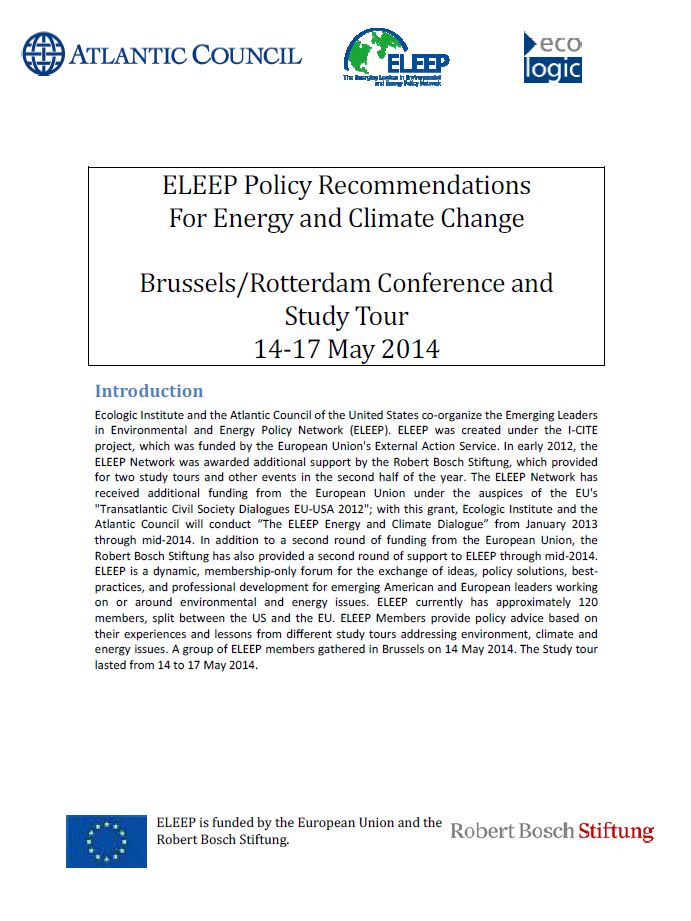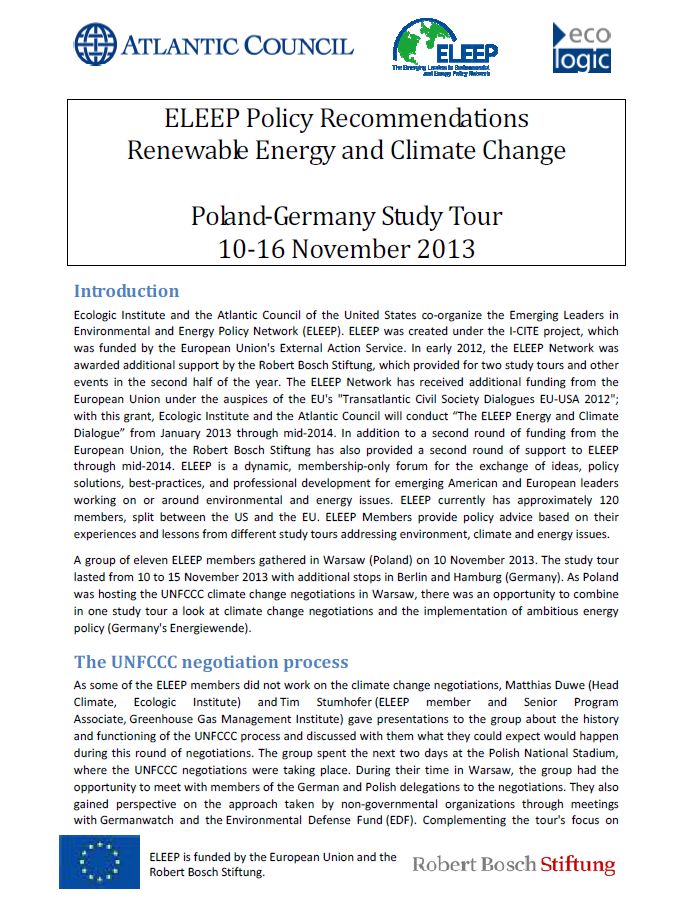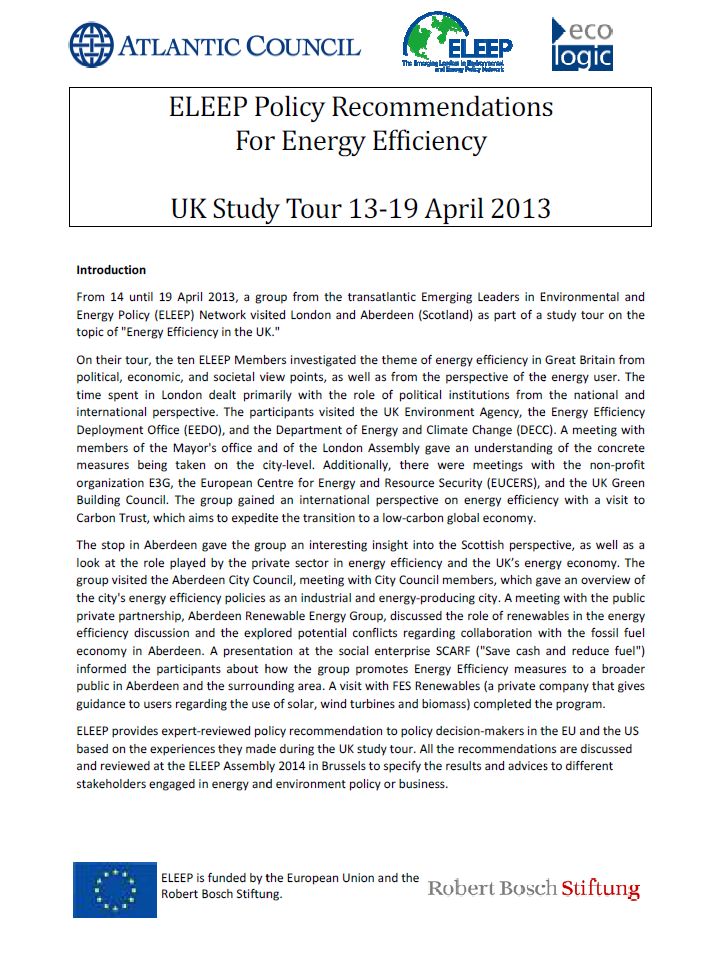Second I-CITE Study Tour: The Sustainable Transformation of Industrial Cities
- Event
- Date
-
-
- Location
- Detroit, Pittsburgh, United States
As part of the I-CITE and ELEEP initiatives, Ecologic Institute and the Atlantic Council of the United States led a transatlantic contingent on a study tour of Detroit and Pittsburgh from 8 to 12 January 2012. The study tour is the second of three held as part of the I-CITE project funded by the European Union; its focus was the transformation of declining industrial regions and opportunities for their sustainable recovery. The tour builds from previous tours organized by Ecologic Institute, specifically the Transatlantic Media Dialogue to the Ruhr Valley in late 2010. This tour also marks the first face-to-face meeting of the ELEEP network; six of the ten participants, three each from the EU and the US, attended.
In Detroit, the tour was focused on the recent history of Detroit, tracing its industrial rise and the challenges that have ensued in the last fifty years. The participants met with representatives from civil society, NGOs, local foundations, business, and local and regional government to learn about pressing issues and current initiatives. Sustainability – environmental, social, and economic – is one of the main focuses of those engaged in rebuilding and rethinking the city of Detroit. It was underscored by Ken Cockrel Jr., of the Detroit City Council, and Peter Auger, City Manager of Auburn Hills. More details of work underway were provided by Faye Nelson, of the Detroit Riverfront Conservancy, Martha Gruelle, of the Wildlife Habitat Council, and Rebecca Salminen Witt, of The Greening of Detroit. On the energy side, DTE Energy spoke with the group about its renewable and energy efficiency efforts. The tour also overlapped with the North American International Auto Show; participants were able to kick the tires of a wide variety of new electric vehicles and including taking a few for a test drive.
Foundations play a major role in conceiving and funding developments in the city and the region. Wendy Jackson discussed the Kresge Foundation's commitment to Detroit and a number of the Foundation's initiatives, including the M1 streetcar line. David Egner, of the Hudson-Webber Foundation, discussed both the Foundation’s work as well as that of the New Economy Initiative, which is a collaboration of local foundations to remake the city of Detroit. Two of the Detroit highlights were the Green Garage and Quicken Loans. The Green Garage, started and operated by Tom and Peggy Brennan, combines a sustainably renovated former car showroom with an incubator for burgeoning green businesses. On the very large scale, Quicken Loans has moved its corporate headquarters downtown and is actively engaged in remaking Woodward Avenue corridor.
As the tour shifted to Pittsburgh, the participants were able to see and discuss the changes that have happened to the city over the past thirty years following the collapse of the steel industry. Business and civic leaders and their political counterparts have been working to remake the physical landscape of the city, as well as provide the foundations for new industrial and employment centers to replace those that came before. The tour in Pittsburgh began with the perspective of the business community in the region through a meeting with the Allegheny Conference on Community Development. Barbara McNees, President of the Greater Pittsburgh Chamber of Commerce, and Bill Flanagan, Executive Vice President of the Conference, and Conference staff traced the history of business involvement in the redevelopment of the city and efforts to make Pittsburgh and the region an attractive place for investment and new businesses. To complete the historical overview, Rob Stephany, Executive Director of the Urban Redevelopment Authority, described the city's efforts to cooperatively redevelop neighborhoods with residents and Lisa Schroeder, President of Riverlife, detailed her organization's work to reimagine and remake the city's riverscape. PNC Bank met with the group to describe its commitment to green buildings and sustainability; it has the largest number of LEED certified buildings of any bank in the United States and its new corporate headquarters in downtown Pittsburgh aims to be the most sustainable highrise in the US. Participants also met with WESCO, Eaton, and Leviton – suppliers and manufacturers of electrical and office equipment – and PPG Industries. After the demise of the steel industry, health care and education have been major drivers of employment in Pittsburgh and region. In terms of the health care industry, the tour met with Dr. Andrew Watson, who is the Medical Director of the Center of Connected Medicine, an initiative of the University of Pittsburgh Medical Center's efforts to reduce health care costs and improve care through information technology. The group also met with several researchers and professors from Carnegie Mellon University working on the electricity sector and infrastructure, including Matt Sanfilippo, who runs the Pennsylvania Smart Infrastructure Incubator.
In addition to these meetings, the participants were also able to see a number of brownfields and former industrial sites that have been redeveloped and repurposed over the previous decades. Matt Mehalik of Sustainable Pittsburgh took the group on a tour of several sites – the Waterfront, the Southside Works – and described developments in other parts of the city – Bakery Square/East Liberty, and the Strip District. The tour ended with a dinner overlooking the city of Pittsburgh, where the participants were joined by Jim Sloss and Aftyn Giles, who work respectively as the Energy and Utility Manager and Sustainability Manager of the City of Pittsburgh. Mr. Sloss helped wrap up the tour by explaining the city's current and ongoing efforts and encouraged the group to return to Pittsburgh in the future.









